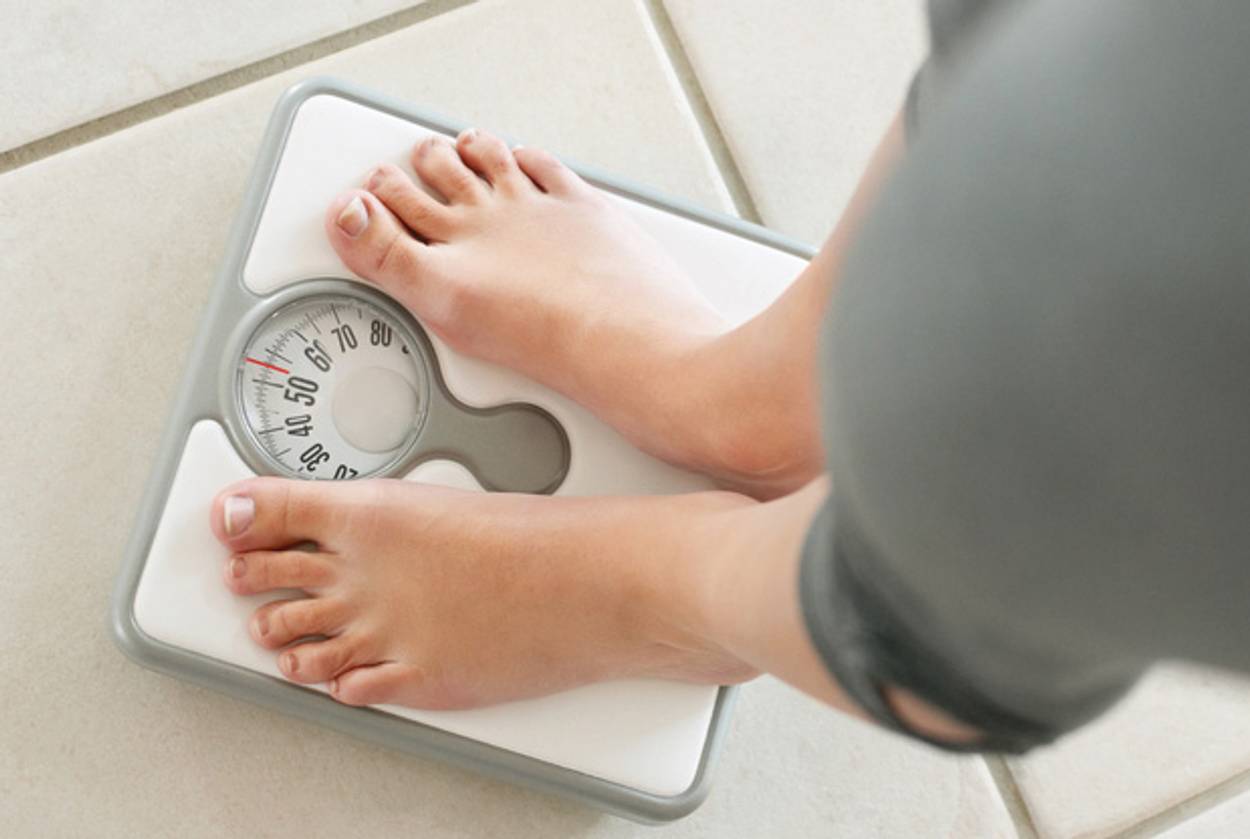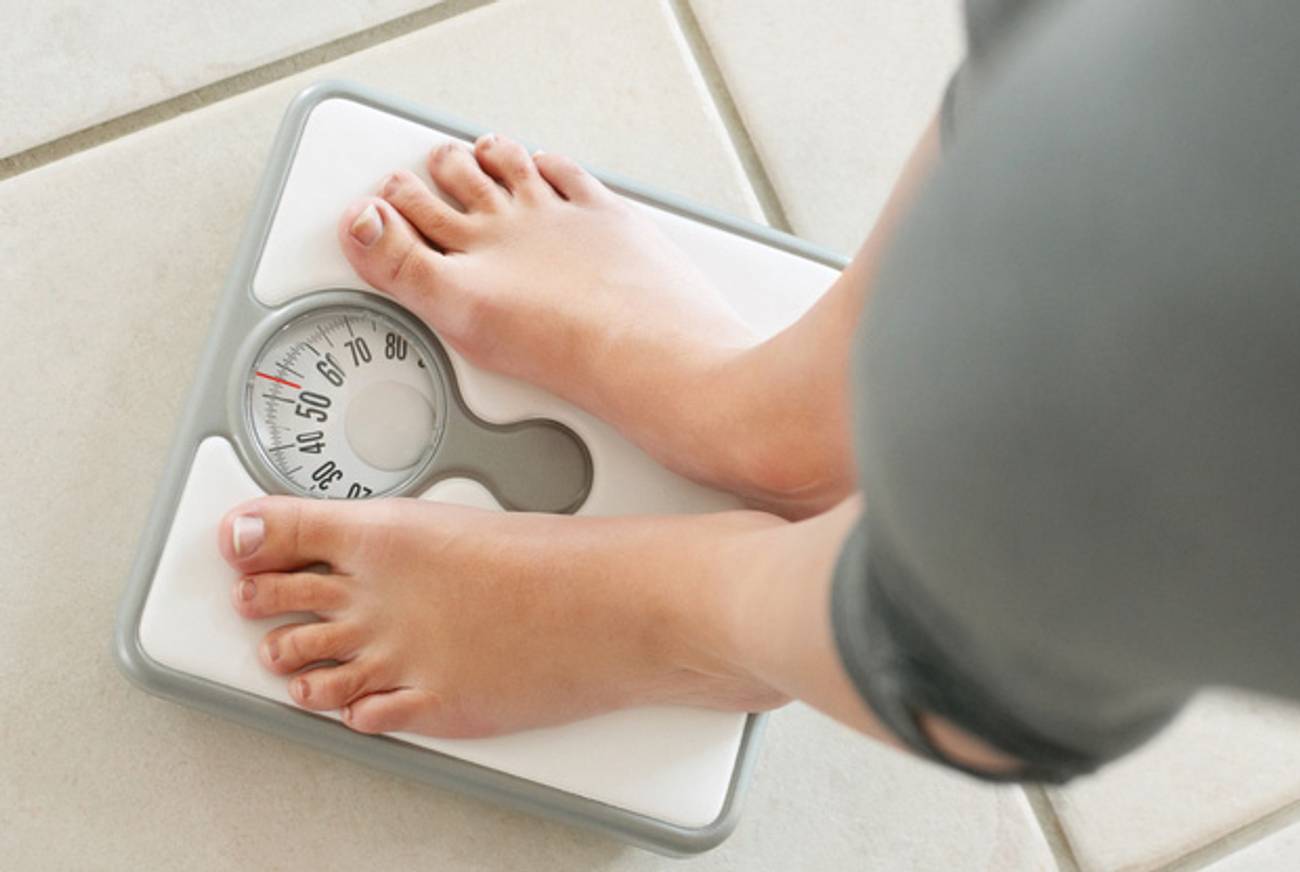Pounds of Flesh
Weighing in on the intersection of body image and prose




How’s your weight? Is today a thin day or a fat one? Oh my God, I ate so much last night, I’m such a cow! Moo!
I exchange these comments with a select group of friends: Jewish ones. Weight—and food—is just not something my non-Jewish friends and I get into. Not that they aren’t as crazy about their bodies as we are—they are, even those who are 5-foot-8 with legs that span the Empire State Building. The difference is that they’re not as vocal about their neuroses. My non-Jewish friends don’t take great pleasure in re-hashing the minute details of the meal they just inhaled, or the hors d’oeuvres that were served at the Shapiro shivah.
Nor do my non-Jewish friends beat themselves up—at least not publicly—for gaining a pound or seven or for no longer fitting into their goal jeans. They might feel the exact same self-loathing that we do, but they don’t believe the whole world needs to know about their troubles.
According to a September 2008 survey of 200 Jewish educators and social workers conducted by Jewish Women International, an advocacy group, respondents reported eating disorders as the number one destructive behavior among Jewish girls (bullying came in second), with a full 75% of respondents observing this behavior in girls ages 12-15, said Lori Weinstein, JWI executive director.
Based on my own experience, I’ll wager some reasons for this. We—or, more specifically, our parents—are perfectionists. The Jews I know are goal-oriented and driven, and quite tough on themselves. But we also want to fit in. Alas, assimilation can only go so far, at least physically. Most Jewish women will never, ever look like we’ve just stepped off the boat from Stockholm, no matter how many highlights we put in our hair. However, since Jews are overachievers, we give it the old college try—and then some. (Titles at a conference held on Jewish women, body image, and food included such gems as “Chopped Liver and Chicken Soup: Soothing Food for the Traumatized Soul and “Zaftig Women in a Barbie Doll Culture”).
What’s more, Jewish women have very few model paradigms out there. As Leslie Goldman, the author of The Locker Room Diaries: The Naked Truth About Women, Body Image, and Re-imagining the Perfect Body notes in an essay on the Huffington Post, while many fashion designers are Jews—Marc Jacobs, Cavin Klein, Zac Posen, and Ralph Lauren—it is almost impossible to find an actual long-limbed, runway-prancing specimen who is. There’s a reason Victoria’s Secret is epitomized by long, lean-limbed Germans and bedroom-eyed Frenchwomen, says Goldman. There’s not much of a demand to see Mayim Bialik in a thong bikini.
Some experts say that certain groups gravitate to specific addictions—the Irish and their Guinness, for example, or rock musicians and their heroin.
In my case, I grew up in a white, upper-middle-class Jewish household. Maybe it was pre-ordained that my drug of choice would be edible. I certainly can’t recall a time when I wasn’t conscious that fat was bad. My mother taped a picture onto the refrigerator of an obese woman rifling through a freezer: a warning of lurking danger. My older sister and I were constantly warned by my mother and her mother never to gain weight. In my mind, getting fat was a terrible tragedy, the worst fate to befall a person. Fat was ugly, undignified, a sign of weakness and failure. When I finally hit puberty and put on about 20 pounds—25 at my heaviest—I was made to feel like Orca.
Obviously, many ethnicities love food, and they all have secret tricks to slimness (it was a Frenchwoman, after all, who penned that book about subsisting on chocolate pastries and champagne and simply not getting fat). But it’s well known that Jews’ relationship with food is an especially charged one. Common wisdom has it that in the back of our minds we’re still terrified of being rounded up, herded off, and starved to death. Having food around combats the fear. As Valerie Frankel, author of the memoir Thin Is the New Happy, notes: The entire Jewish culture is based on, ‘We killed them, they killed us, let’s eat.’ We push food on each other to express our love, and our safety.
Frankel’s is hardly the only book about food and weight. Scroll around Amazon and you will find hundreds of books about food and weight. Not just diet, exercise, and self-help books, but novels and memoirs about losing weight, gaining it, thinking about it, or learning to accept yourself as you are. Many of these are written by Jews. In addition to Frankel’s work, there’s Jami Bernard’s The Incredible Shrinking Critic, Lori Gottlieb’s Stick Figure, Stephanie Klein’s Moose: A Memoir of Fat Camp, and my own, Teenage Waistland, which tells the story of my six years at fat camp—though I was never that big. And those are just the nonfiction offerings. Among novels, you’ve got Jennifer Weiner’s Good in Bed and In Her Shoes, both featuring zaftig heroines, and Jillian Medoff’s Hunger Point, about two sisters coping with anorexia.
Of course, Jewish women are not the only ones to obsess about their bodies, as is evidenced by the throng of empowering women’s magazine articles featuring models with a body mass index of about seven.
Both Jen Lancaster’s Such a Pretty Fat and the late Judith Moore’s Fat Girl hit the New York Times bestseller list—although those books were not so much about losing weight as about accepting yourself as you are. I know of only two books in that category written by Jews: Wendy Shanker’s Fat Girls Guide to Life and Jessica Weiner’s A Very Hungry Girl: How I Filled Up on Life…and How You Can, Too! What this says to me, of course, is that Jewish women—for the most part—aren’t okay with being fat. Valerie Frankel gets straight to the point: I will never not want to be thin. I just won’t. I’m much happier when I’m thin.
But, given the fact that body image issues are a source of anxiety across cultures, why do Jewish writers in particular spill so much ink to address it?
Frankel, whose book was published this summer and who grew up in Short Hills, New Jersey, a well-heeled suburb, believes it has to do with the fact that we need outlets other than therapy for our emotional baggage. The Jewish mothers were more into their daughters putting up appearances than the gentiles, she says. I don’t know if that’s an insecurity about being Jewish, but Jewish mothers go that extra mile. They look good—and they want their kids to look good.
And the standards for good looks in Jewish households tend to be a little more abstruse. I got an email from someone saying it pissed her off to read a book by someone who wasn’t that huge—I was ‘only’ a size 14, says Frankel. The woman was obviously not Jewish, because a Jewish woman would say, ‘Oh, my god, she was a 14? What a cow!’
For some people, no amount of harassment about weight is too much (when I was 12, my own grandmother wouldn’t let me visit her in Florida unless I lost 10 pounds). Frankel recalls reading Frances Kuffel’s Passing for Thin, and the author describing how lovingly her parents treated her, despite her obesity. I’m reading this and I’m thinking, ‘Oh my God, if this were a Jewish family…!’ says Frankel with a laugh. My parents outright admit that it was about wanting to have beautiful children.
Then there’s the fact that we Jews are so hard on ourselves. Life is about suffering, and who wants to suffer in silence? Jewish women are raised in many ways to believe that endurance of hardship is a sign of strength, says Rivka Tadjer, the author of Two Weeks Under, a novel about eating disorders and identity theft. In general, Jewish women are brought up to be able to handle things, and stuff their emotions for the sake of others. It’s a badge of honor to be able to handle everything while delivering excellence all the time. Not being able to is not just a sign of weakness, but lack of intelligence.
This serves us well, but it is also treacherous emotionally and I can see how it manifests in eating disorder, she continues.
In Stephanie Klein’s Long Island household, controlling her weight made her feminine. It’s what made us women, she says. Women drink coffee, wear stockings, and go on diets. Especially during the holidays. I used Yom Kippur as an excuse to kick-start a fasting diet.
Didn’t we all.
Abby Ellin is a writer in New York City and the author of Teenage Waistland: A Former Fat Kid Weighs In on Living Large, Losing Weight, and How Parents Can (and Can’t) Help.
Abby Ellin is the author of the forthcoming, “Duped: Double Lives, False Identities and the ConMan I Almost Married.”